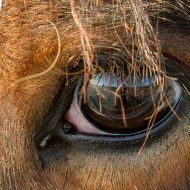
Experts from across the globe will speak at the charity's 25th annual conference
“When does horse use become abuse?” is set to go under the spotlight at the 25th annual World Horse Welfare Conference.
Taking place on Thursday (10 November) at the Royal Geographical Society, London, the event is expected to attract more than 600 guests to discuss strategic issues that impact horse welfare globally.
HRH The Princess Royal, the charity's president, is also expected to join the proceedings, along with expert speakers from the USA, Latin America, Europe and the UK.
In recent years, the line drawn between the acceptable use of horses and abuse has shifted, with many members of the public, and many equestrians, placing a greater emphasis on horse welfare. High-profile incidents have sparked public concern, while discussions over whether traditional equine practices are still acceptable increasingly escalate on social media.
"The crucial link between truly prioritising horse welfare and maintaining our social licence to operate is getting more recognition in horse sport, but this concept also applies much more widely to all uses of horses, be it horse riding, carriage riding, tourism, therapy, conservation grazing, rewilding and even keeping horses as companions,” explained Roly Owers, chief executive of World Horse Welfare.
“What was previously acceptable is often no longer considered so, but where is the line now drawn, and who decides?”
Among the speakers at WHW's annual conference include Mark Wentein, chair of the European Horse Network, who will deliver a talk on ‘The horse in Europe: relevance and responsibilities'. Tamara Tadich, an associate professor at the Universidad Austral de Chile will speak on ‘Getting the balance right for working equids’ while Matt Brown, US five-star Eventer, will deliver a talk on ‘We all need to do better’.
A live discussion panel will further explore the theme of abuse, with representatives from World Horse Welfare, the RVC and the Racing Post. Chaired by Sky News sports editor Nick Powell, the event will also be attended by UK chief veterinary officer, Professor Christine Middlemiss.
The Hybrid in-person event is by invitation only, but anyone with an interest in horses and animal welfare can register to watch the conference live on the charity's website. After the event, the discussions will also be able to watch on WHW's YouTube channel.



 FIVP has shared a survey, inviting those working in independent practice to share their views on the CMA's proposed remedies.
FIVP has shared a survey, inviting those working in independent practice to share their views on the CMA's proposed remedies.